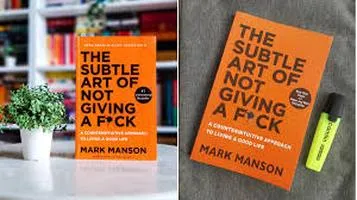A Refreshingly Candid Take on Self-Improvement: A Review of "The Subtle Art of Not Giving a Fck"
"The Subtle Art of Not Giving a F*ck" by Mark Manson is a refreshing take on the self-improvement genre, focusing on the idea that the key to a fulfilling life isn't about trying to be positive all the time. Instead, Manson advocates for choosing what truly matters and letting go of the rest. He argues that life’s struggles give it meaning, and by embracing our limitations and accepting the harsh truths, we can find courage and resilience. The book combines humor, blunt honesty, and philosophical insights, encouraging readers to focus on their values and prioritize their commitments. By learning to care about fewer things but with greater depth, Manson suggests, we can lead more grounded and meaningful lives.

Self-help books often come wrapped in layers of optimism, inspiring quotes, and a generally upbeat tone. Mark Manson's "The Subtle Art of Not Giving a Fck: A Counterintuitive Approach to Living a Good Life" is a departure from this norm. With its audacious title and no-nonsense approach, it stands out in the crowded self-improvement genre and offers a refreshing, candid perspective on how to live a more meaningful and fulfilling life.
A Bold Approach to Prioritization
At the heart of Manson’s book is the concept of prioritization. He argues that our capacity to care is finite, and thus we should be selective about what we choose to give our fcks about. Rather than spreading ourselves thin by trying to care about everything, we should focus on what really matters to us. This isn’t about being indifferent or apathetic; it's about honing in on the values and pursuits that are genuinely important to our well-being and personal growth.
Manson's approach is both liberating and pragmatic. By encouraging readers to abandon the relentless pursuit of positivity and embrace life's inevitable struggles, he offers a more realistic path to happiness. The idea is to accept that suffering and failure are integral parts of life and to find meaning and personal growth within these experiences.
Philosophical Underpinnings
What sets "The Subtle Art of Not Giving a Fck" apart from other self-help books is its philosophical depth. Manson draws from a range of philosophical traditions, including existentialism, Stoicism, and Buddhism, to build his arguments. He challenges the pervasive cultural narrative that we must always strive for more—more success, more happiness, more approval. Instead, he suggests that we should embrace our limitations and focus on what we truly value.
Manson's philosophical musings are not just abstract theories but are grounded in practical advice. For instance, he discusses the "self-awareness onion," a metaphor for peeling back the layers of our psyche to understand our true motivations and desires. This kind of introspection is crucial for figuring out which values are worth our time and energy.
Relatable Anecdotes and Personal Stories
Manson’s writing is infused with humor, wit, and a healthy dose of irreverence. He uses a mix of personal anecdotes, historical examples, and contemporary cultural references to illustrate his points. His stories are often self-deprecating and relatable, making the book engaging and accessible.
For example, Manson recounts his experiences of failure and rejection, from his failed music career to his struggles in the dating world. These stories serve to humanize him and make his advice more relatable. They also underscore his central message: that failure and pain are not only unavoidable but also necessary for growth and development.
Critiques and Counterpoints
Despite its many strengths, "The Subtle Art of Not Giving a Fck" is not without its criticisms. Some readers may find Manson’s tone too abrasive or his language too coarse. The frequent use of profanity, while aligning with the book’s rebellious spirit, might not appeal to everyone.
Moreover, Manson’s advice to prioritize only a few key values can be seen as overly simplistic. Life is complex, and our responsibilities and interests can often be in conflict. While the idea of focusing on what truly matters is sound, the execution can be more challenging in practice.
Additionally, some critics argue that Manson’s approach lacks a nuanced understanding of mental health issues. While his message to embrace suffering and failure is generally positive, it may not be applicable to those dealing with severe mental health challenges. For such individuals, professional help and tailored strategies are often necessary.
Conclusion
"The Subtle Art of Not Giving a Fck" is a breath of fresh air in the self-improvement landscape. Mark Manson’s candid, irreverent, and philosophically rich approach offers a compelling alternative to the relentless positivity that dominates the genre. By encouraging readers to embrace their limitations, prioritize their values, and find meaning in life’s inevitable struggles, he provides a more grounded and realistic path to personal fulfillment.
While the book’s tone and language may not be for everyone, its core message is universally relevant. In a world that often pressures us to care about everything, Manson’s advice to be selective and intentional about our fcks is both liberating and empowering. Whether you’re a self-help enthusiast or a skeptic, "The Subtle Art of Not Giving a Fck" is worth reading for its refreshing take on what it means to live a good life.






